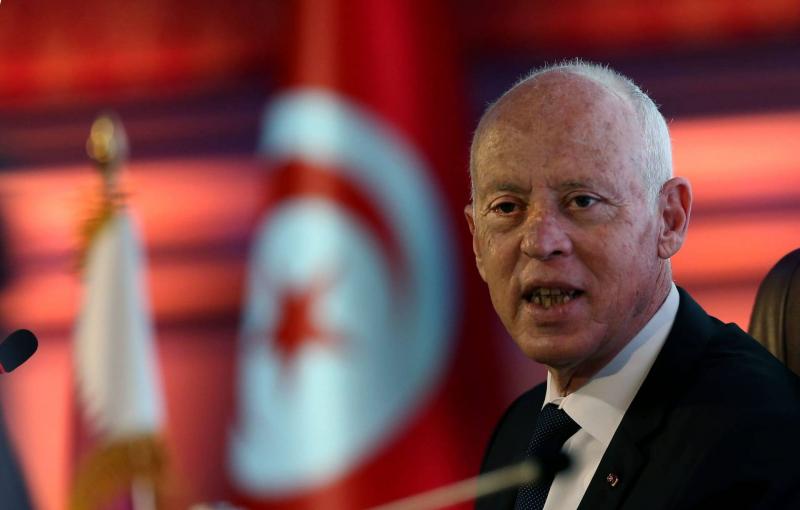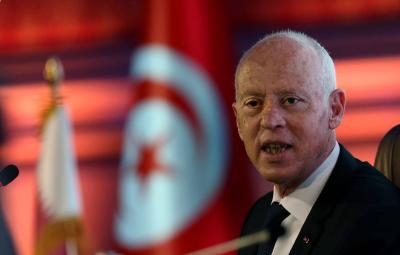It is not in Tunisia's interest to promote the idea that the issues raised against politicians are primarily aimed at preventing them from running and competing with President Kaïs Saïed in the elections. The reality might be quite the opposite, as the ongoing arrests, imprisonments, and trials are linked to actual cases stemming from the previous era. However, external observers cannot grasp the timing correlation between those who submitted their candidacies for the elections and the issues raised against them.
From the outside, it might seem as though Kaïs Saïed fears that some opposing politicians would run against him in the elections and seeks to remove them from his path by resurrecting old cases against them. Yet, on the ground, it is challenging for anyone included in the previous or current cases to effectively compete with Kaïs Saïed, given the public mood and their attitudes toward the previous phase and its symbols, as well as the ongoing support Saïed receives from large sections of the populace. This is true even if his enthusiasm may have waned, as indicated by some opinion polls.
It is crucial to remember that those who claim their arrests and the delay of their trials aim to deny them participation in the elections had previously attempted to run for the presidency or legislative positions and ended up with inconsequential results. Apart from those accused of terrorism or embezzling public funds, why not establish an electoral truce allowing these individuals to try their fortunes again with nearly predetermined outcomes? For instance, what threat could Lotfi Maraïhi, head of the Popular Republican Union Party, pose in the elections if he participated and later faced an investigation regarding the allegations against him?
No one is asking the authority to relinquish its rights nor the opposition to remain silent or retract, but what is needed is to resolve disputes through calm channels, among which holding elections and maintaining a clear space for freedom of opinion and expression are essential. Could Abir Moussi pose a problem for Kaïs Saïed if she participated in the elections, ran a campaign, and unleashed criticism as she did before? Regardless of her efforts, her political and popular movement is restricted, and part of this segment now supports Khan Saïed, seeing him as the most capable of achieving what Moussi herself aimed for, especially regarding limiting the penetration of Islamists, dismantling their infiltration of state institutions, and combating their external extensions.
What challenge could Safi Saïed, Abdul Latif Al-Makki, or Mundhir Al-Zanidi present to President Saïed if they campaigned, critiqued, and presented ideas or slogans? Logical analysis suggests that individually or collectively, they cannot defeat Kaïs Saïed in the elections, even if they nominated a representative to the second round and agreed to vote for him. This is unlikely to happen due to the contradictions in backgrounds and agendas within the opposition, which has not yet evolved—neither it nor its supporters—into a concept of electoral coalitions based on minimal common ground and remains hostage to ideology.
However, the participation of these politicians adds vitality, enthusiasm, and international attention to the elections, granting significant legitimacy that positively impacts Tunisia’s image and Kaïs Saïed personally, dispelling many doubts and accusations directed at him by opponents and external organizations. Participation in the elections puts everyone in their rightful place, dispelling illusions and cutting off the pathway to chaos and victimhood rhetoric.
Perhaps President Saïed will be subjected to numerous accusations and personal attacks during the electoral campaign and will see this as an injustice against him and his image. Still, this is the price of democracy, political plurality, and freedom of opinion, and people will differentiate between honesty and injustice. It is better for politicians to express their ideas publicly instead of passing them in secret and on platforms dominated by slogans, resentments, and settling scores.
It serves Tunisia's interest and that of Kaïs Saïed for him to enter competitive elections robustly, surrounded by debate and discussions rather than winning against figures of limited influence who declare from the start that they are participating for participation's sake. Winning is the same, but the tools differ, and their results will be different for Tunisia’s image abroad.
The enthusiasm of Kaïs Saïed's supporters leads them to assert that external evaluations and positions are unimportant and that it suffices for the Tunisian president that he has imprisoned the symbols of the previous regime without distinction, whether they are candidates or not, as the law does not concern itself with such details. However, the problem is larger than that. What his supporters perceive as a view focused inward may resonate with the people, but it is not the same echo as right after July 25, 2021. The level of interest has changed.
People do not tolerate mentioning politicians who previously ruled due to the many mistakes they made. However, the focus has now shifted to the economic and social situation, which Kaïs Saïed himself has understood, as he is now concerned with direct details related to daily life, such as transportation, health services, education, roads, minimum wage, and the status of retirees.
It is important to note that external observation of any country does not stop at media reports that may be biased or unsatisfactory to the authority and its audience, stirring up old details or data. The external landscape is more than just media; it constitutes a significant public opinion that shapes the image of any country. It is from this perspective that financial, economic, tourism organizations, and others draw in determining positive or negative rankings for any country.
There is a tendency among the public to hastily pass judgments like "let the external world go to hell," or that the country will rely on itself and its capabilities without needing the outside, often invoking classical populist descriptions of attacking imperialism and linking everything to conspiracy theories and Zionism.
Relying on oneself is important in shaping policies, austerity, combating corruption, and creating a favorable climate for investment and tourism. However, it does not negate the role of external factors in a country where its capital lies in its image, stability, moderation, and openness to others—principles that have been established in the country's traditions for decades.
Can Tunisia enter presidential elections in this environment charged with tension and unmeasured reactions? What image will foreign media, organizations, and guests crossing borders convey while they observe the elections for weeks? Will they label it as a healthy sign or an indicator of instability?
Tunisians know in advance that some external circles work through exaggeration, diverting attention, and “making a mountain out of a molehill,” as the saying goes. Why provide them with a justification to misrepresent the country beyond what the authorities wish to portray?
It is imperative to emphasize that repeating these confrontations for various reasons depletes Tunisia's global reputation because Western media or European politics see nothing but an authority pressuring dissenting opinions. It will not be understood as a conflict between a force of regression and a decisive state, as claimed by activists loyal to the authority.
No one is asking the authority to relinquish its rights, nor the opposition to remain silent or retract; however, there is a requirement to address disagreements through peaceful channels. Among these channels is conducting elections, preserving a clear space for freedom of opinion and expression, and allowing civil society and human rights organizations a margin of movement while ensuring everyone operates under legal oversight.




